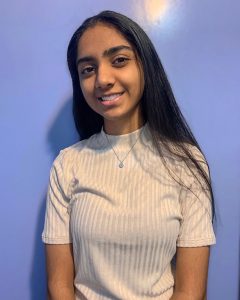]]>“It’s unprecedented. Kamala Harris would be the second person of color who ever served as president,” said Dr. Christina Greer, an associate professor of political science at Fordham University who is a regular commentator on cable news. “We’re one of the last democracies in the world [that’s] never elected a woman to the highest office. The silver lining is, even though it’s late in the game, it’s not too late. And it’s before the convention.”
Greer said that Harris will likely continue Biden’s radical attempts to relegate, reform, and abolish student loan debt, something that has actively changed the lives of millions of student borrowers. Some of Biden’s policies for higher education were more popular than others, so Greer added that Harris will have to thread the needle carefully when sharing the Biden administration successes while highlighting her own policies.
Etienne’s journey to the World Cup has been fueled by her experiences at Fordham, where she played three seasons for the Rams, and by five years competing for the Haitian national team. Her paternal grandfather immigrated to the U.S. from Haiti, and she grew up in Paterson, New Jersey. She said representing her ancestral country—and particularly being part of something positive for a nation in turmoil—is the highlight of her young career.
“It’s definitely an honor and a privilege,” she said from her hotel in Perth, Australia, just ahead of the World Cup. “We know what happiness the team brings to the country. Every time we step out on the field, it’s kind of our responsibility and we don’t take it lightly.”
Here are six things to know about Danielle Etienne.
1. She helped put the Haitian national team on the sport’s biggest stage.
While Haiti is making its first appearance in a Women’s World Cup, this is a second of sorts for Etienne, who, along with several current teammates, had a tiny taste of the world stage when she participated in the U-20 World Cup in 2018.
“I was 17 years old, going to the U-20 World Cup, and I felt like I was even younger,” she said. “I definitely feel a little bit more mature now, and have more composure, more experience. And I think it also feels different because it’s the FIFA Women’s World Cup. This is what I watched as a little girl. I’d grown up watching my idols, like Marta, at a World Cup, and now I’m playing in the same World Cup as her. That’s insane!”
2. Soccer is in her DNA, and her father and brother help keep her focused.
Etienne lives by the motto “Faith, Family, and Football.” Her father, Derrick Etienne Sr., played professionally in the U.S., and her brother, Derrick Jr., is a midfielder with Major League Soccer club Atlanta United. Both played for the Haitian national team. So, when they give advice, she listens.
“My father always told me and my brother that we have to work for everything that we want, and we can’t expect anything to be given to us,” Etienne said. The other voice in her head is her brother’s, guiding her when she gets sidetracked by those who doubt her.
“I was giving other people so much power and letting their words affect me. My brother told me, ‘Don’t worry about proving people wrong, worry about proving yourself right.’ I know I have the talent, I know I have the potential. I just have to put in the work.”
3. She had a special feeling about Fordham when she visited Rose Hill.
Etienne had three criteria for selecting a college: great academics, a strong soccer program, and proximity to her family in New Jersey. Fordham checked all the boxes.
“Once I got on campus, I felt it,” she said. “I felt like it was the right place and environment. And then I actually got to talk to girls on the team, and you could tell they were just so genuine. They were very forthcoming in terms of information and what their experience was like. And talking to the coaching staff as well, and understanding what they wanted to do within the program, to build the team. So, the combination of those things all kind of just made it into a very great package for me.”
Etienne was named to the Atlantic 10 Conference All-Rookie Team in 2019, and she earned a spot on the A-10 Commissioner’s Honor Roll in each of the three seasons she competed for the Rams.
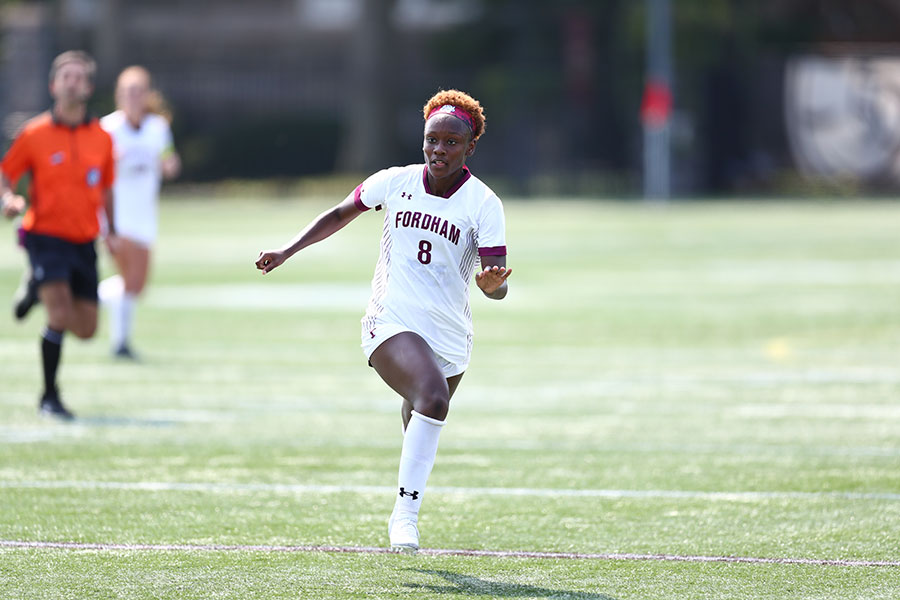
4. During the pandemic, and Fordham’s “season without sports,” Etienne helped advance the University’s anti-racism action plan.
Etienne said that in 2020, amid social unrest and calls for racial justice after the killing of George Floyd, she was fortunate to have a supportive team environment where she could share the concerns she had—about her brother or father being pulled over by the police, the stressors of attending a predominantly white institution, and everyday microaggressions. What started as a conversation with her soccer teammates led to a diversity, equity, and inclusion group that branched out into the athletics department at Fordham. Etienne led the subcommittee on education and worked to bring in speakers of color who discussed their experiences.
“It’s one of the things I’m very proud of, leaving that at Fordham,” said Etienne, who received an Ignatian Social Justice/DEI Award from the Fordham athletics department in 2021. “Knowing that I didn’t just say, ‘I’m a student-athlete.’ But there are some things that are going on in the world that we have to acknowledge. And then we have to see what we can do to be better. Because if we’re not part of the solution, then we’re part of the problem.”
5. She’s inspired by the growth of the women’s game both in the U.S. and globally.
Etienne points to the historic U.S. women’s national team’s win for equal pay, the talent of the players in the National Women’s Soccer League as well as the expansion of the league, and the support for players, like her, who have children and return to the game.
“I’m proud that this is the era that I’m in now, and that I have even more opportunities because of all the people who came before me,” she said. “Knowing what it was like 10, 15 years ago, and seeing how much progress has been made, I’m proud of how far we’ve come.”
6. Her Fordham psychology degree and volunteer work are prep for her post-soccer career.
If she wasn’t playing soccer, Etienne said she would be working to make a difference in her community and counseling those in need. With the Etienne Family Foundation, started by her brother, she has helped support youth in her hometown of Paterson, New Jersey, conducting fitness and soccer clinics and raising money for equipment and places to play. They also organize coat drives and fundraisers to bring supplies to the many in need in Haiti.
“It is important you remember that there are so many people who are less fortunate than you, and who deserve a chance as well,” she said. “And the next Messi or the next Marta can be sitting in Haiti with no cleats right now.”
—Tracey Savell Reavis, FCLC ’01, is a veteran journalist with more than 20 years of writing, editing, and teaching experience, and author of a book on the career of footballer David Beckham (Rowman & Littlefield, 2014). She publishes The Club, a newsletter covering the U.S. national teams and world football. Traveling to New Zealand to cover her first World Cup is a dream come true.
]]>Born in South Carolina in 1916, she moved to New York City to live with an aunt during the Great Depression. By 1974, when she earned a bachelor’s degree from Fordham College at Lincoln Center, she was in her late 50s. She had served as executive secretary of the city’s Community Mental Health Board, and two years earlier, helped form and lead Black Citizens for Fair Media, a volunteer group that challenged broadcasters’ discriminatory employment practices and negative depictions of Black people.
“At first we thought broadcasters could do as they pleased. … Then we found out that ‘the airwaves belong to the people,’ and that phrase became our slogan and call to action,’” she once wrote.
They pressured major networks into changing their programming, employment, and training policies—and if they resisted, Bowen’s group filed challenges to the renewal of their broadcast license with the Federal Communications Commission until they relented. In the late 1980s, her group became the Foundation for Minority Interests in Media. Renamed the Emma Bowen Foundation following her death in 1996, it connects students of color with internships at leading media companies.
At Fordham, Emma Bowen’s spirit is reflected not only in the public service mission of WFUV but also in the students supporting Bronx farmers markets through the Center for Community Engaged Learning and in alumni like trustee Valerie Irick Rainford, FCRH ’86, and Patricia David, GABELLI ’81, recently honored by Inclusion magazine as “trailblazing leaders who wrote the playbook for implementing” diversity, equity, and inclusion values and practices in the workplace. Bowen’s life and legacy deserve to be better known.
]]>Fordham trustee Valerie Irick Rainford, FCRH ’86, and Patricia David, GABELLI ’81, are among the eight executives in the magazine’s Diversity, Equity, and Inclusion (DEI) Hall of Fame Class of 2023.
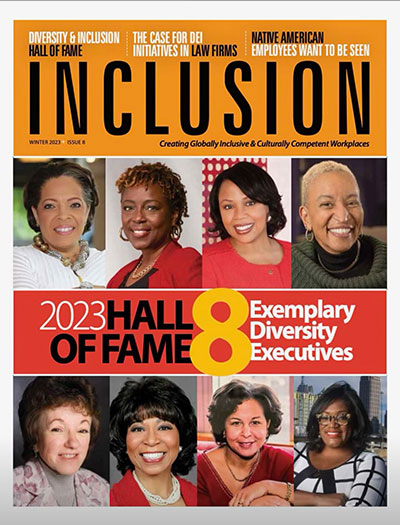 In her “Last Word” column in the winter 2023 issue of the magazine, Sheila A. Robinson, the founder Diversity Woman Media, noted that Rainford, David, and the other honorees “began this work before there even were titles like chief diversity officer.”
In her “Last Word” column in the winter 2023 issue of the magazine, Sheila A. Robinson, the founder Diversity Woman Media, noted that Rainford, David, and the other honorees “began this work before there even were titles like chief diversity officer.”
“While we still have a long way to go and much work to do, now is the time to salute those women and men on the front lines who have made a difference. … They paved the way for the rest of us,” Robinson wrote, “and their tireless work in the trenches of the battle for equity, inclusion, and belonging is why I feel optimistic for the next generation.”
A ‘Pay-It-Forward Commitment’ to Elevating People
David, who was born in England and grew up in the Bronx, graduated from Fordham’s Gabelli School of Business in 1981 with a bachelor’s degree in finance and economics and a minor in accounting. She capped a decades-long corporate career at JPMorgan Chase, where she served as the chief diversity officer and was instrumental in launching the company’s Advancing Black Leaders strategy and its Office of Disability Inclusion, which she described as her proudest achievement.
“Disability can and will affect everyone,” she told Inclusion magazine. “Raising awareness, busting the myths, and being intentional about this community was personally refreshing to me.”
The magazine also noted David’s “pay-it-forward commitment” to supporting students at Fordham, where she has “led large-group diversity education sessions for first-year students” at the Gabelli School of Business and supported a high-school pipeline program to help bring more students of color to Fordham.
In 2016, she received an honorary doctorate of humane letters from Fordham and delivered the keynote address at the Gabelli School of Business graduate diploma ceremony. One year earlier, the Gabelli School paid tribute to her by creating the Patricia David Trailblazer Award, presented annually to a graduating senior who has demonstrated a dedication to inclusiveness in the business world.
Since retiring from JPMorgan Chase in 2018, David has been working as a mentor, coach, and consultant. She also recently published a book, The ‘Her’story of Davidisms: My Straight-Shooting Answers to 30 Years of Career Questions People Have Asked Me (Picard Press, 2021).
Challenging Assumptions, Providing Opportunities
Like David, Rainford grew up in the Bronx and eventually worked at JPMorgan Chase, where she was a managing director and led the company’s Advancing Black Leaders strategy.
“Under her leadership, representation of Black professionals rose to historic levels, with an increase in Black senior executives by over 50 percent in three years,” Inclusion magazine reported.
Prior to her tenure at JPMorgan Chase, she had a 21-year career at the Federal Reserve Bank of New York, where she was the first Black woman to rise to senior vice president. Today, as the founding CEO of Elloree Talent Strategies, she advises C-suite executives on the best strategies for advancing diverse talent.
She is also the author of an award-winning memoir, Until the Brighter Tomorrow: One Woman’s Courageous Climb from the Projects to the Podium (Eloree Press, 2014), and a founding member of the Black Women for Black Girls Giving Circle. She has received numerous awards and distinctions, including recognition on Black Enterprise’s list of the Most Powerful Women in Business and on The Network Journal’s list of 25 Most Influential Women in Business.
Rainford has been a generous supporter of Fordham and its students. She joined the University’s Board of Trustees in 2019, and in early 2021, she was the driving force behind the creation of the Diversity Fund, which provides financial aid to economically disadvantaged undergraduates and those from underrepresented groups who are living on campus.
“I want my legacy—from struggle to success—to challenge long-standing assumptions and expectations for what talent from underserved communities can achieve when provided with access and opportunity,” she told Inclusion magazine.
]]>While Fordham Law School was founded to serve people who had traditionally been excluded from the legal field, “we have significantly more work to do … to truly ensure that all of our students, particularly those from underrepresented communities, experience a learning environment that is supportive and free from bias,” Matthew Diller, dean of the law school, said in an October 2020 statement.
Among many other efforts, the school expanded its Increasing Diversity in Education and the Law (IDEAL) program, a pre-law program for New York-area college students from diverse backgrounds. In August 2021, the school launched its Realizing Excellence and Access in the Law (REAL) Scholar’s program to provide peer advising, mentoring, a pre-orientation program, and other support to first-year law students from underrepresented groups.
The law school also brought in consultants for in-depth surveys that informed new diversity, equity, and inclusion (DEI) efforts across the Fordham Law community.
These initiatives were enabled by benefactors including David Tanen, a 1996 Fordham Law graduate who has been a member of the Dean’s Planning Council and given back to the law school for more than a dozen years, making philanthropic investments to enhance its educational environment.
His experience at Fordham Law continues to enrich his life, he said, because of the friendships, connections, and skills he gained there. A native of small-town Nahant, Massachusetts, he initially pursued a legal career by majoring in criminal justice at George Washington University in Washington, D.C.
He came to Fordham Law wanting to be a criminal defense attorney, but pivoted after graduation to work in the life sciences industry. Today, he is a partner with Two River, LLC, a venture capital firm in New York City that he co-founded in 2004. He has been a cofounder, officer, and director for a number of the firms incubated by Two River, including Kite Pharma, Inc.
Tanen has made major gifts in support of the law school’s diversity efforts, helping to advance a key priority of Cura Personalis | For Every Fordham Student, Fordham’s campaign to raise $350 million for enhancing the student experience across the University. And he previously provided funding for six professionalism fellows, upper-level law students who promote mentorship, professionalism, and inclusion among students as part of the law school’s “house” system. Begun in 2019, the house system sets up communities of faculty, alumni, student advisers, and others to provide support and guidance for students.
Discussing his reasons for giving back to Fordham Law, he cited the collegial school character that he experienced as a student, as well as the law school’s culture that makes change and progress in anti-racism efforts a realistic aspiration.
How did your giving in support of diversity efforts at Fordham Law come about?
It was shortly after the murder of George Floyd that I met with Dean Matthew Diller and Assistant Dean Vera Tkachuk, and we were talking through some of the initiatives that they wanted to implement. Of particular note was an Instagram account called Black at Fordham Law, which highlighted some of the concerns about discrimination. Dean Diller was understandably concerned about the student experience at Fordham Law and recognized that this is an issue that needed to be addressed and addressed quickly. Fostering a more inclusive community where people from all backgrounds feel that they are welcome is important, not just for the law school but for all academic institutions and professional environments. This was something that resonated with me.
This was a seismic event—a cultural shift. There are challenging conversations to be had. My aim was to help provide resources to the law school so they could implement programs and facilitate those discussions.
Has your own work shown you the importance of DEI efforts?
Absolutely. Having an understanding of different perspectives can only provide for a better experience in the classroom and in the conference room or boardroom. For a long time, boards were dominated largely by white men, but we have initiated efforts at our companies to expand diversity at the management and board levels.
Moreover, our portfolio companies research and develop novel therapeutic technologies intended to address unmet medical needs, primarily in oncology. In drug development, ensuring people from diverse backgrounds join clinical trials is key to advancing health equity. Participants in clinical trials should represent the patients that will use the medical products. This is often not the case—people from racial and ethnic minorities and other diverse groups are underrepresented in clinical research. This is a concern because people of different ages, races, and ethnicities may react differently to certain medical products. The Food and Drug Administration encourages diverse participation in clinical trials.
Tell me about your support for the house system and the professionalism fellows.
The house system is a unique way of providing support to students. It creates a smaller community within the larger Fordham Law School community that promotes mental health and well-being and teaches some of the softer skills that aren’t taught in the classroom, and which are important to developing legal skills and critical thinking. Being solution oriented, communicating effectively, and working collaboratively are vital skills that are necessary for being a successful attorney and a better advocate. The professionalism program helps develop these skills. It also helps develop extra-legal skills that may be necessary, like financial literacy, but that are also useful in your professional and personal lives, such as cross-cultural understanding.
Have you faced a career challenge that offers a lesson for today’s students?
Growing up, I knew that I wanted to go to law school and focus on criminal law. As an undergraduate, I majored in criminal justice and at Fordham I focused primarily on criminal law classes and joined Fordham Law’s first trial advocacy team. Following graduation, however, I was unable to secure a position at any of the district attorney’s offices in New York. That’s when one of my classmates from Fordham Law reached out to me about an opportunity to join a boutique life science venture capital company. At the time, I wasn’t sure what a boutique life science company was. Nonetheless, disappointed with the failure to secure a position in criminal law, I decided to pivot to the corporate world, and it changed my life in meaningful ways.
Since then, together with my partners, we have built a number of successful biotechnology companies, created thousands of jobs, driven meaningful value for investors, and most importantly, brought life-saving therapies to patients who desperately need them. Venture capital was never a vocation that I had envisioned for myself. I always saw myself cross-examining someone in a courtroom rather than negotiating a contract in a conference room. The experience helped me to understand that when life presents you with challenges, you need to be flexible and take advantage of opportunities when they’re presented to you. It’s like the old adage goes—when life give you lemons, make lemonade.
This concept of adapting to change is nicely presented in a book I found influential—Who Moved My Cheese?, by Spencer Johnson. It’s about what you do when that “cheese” you’ve been chasing—in my case, being a criminal law attorney—is no longer there. I had to face my fears—“Okay, what do I do now? This is what I’ve built myself up to be over the last 24 years. Now, what am I? Where am I? How do I address this?” The lesson I learned is that you have to be open minded, you have to be flexible, and be ready to pivot to a new opportunity when it presents itself.
How did your Fordham Law education help you in this transition?
One of the things that I appreciate about Fordham Law is that it teaches you how to practice the law. At some other schools you learn about the philosophy of law, which is also important. However, with my Fordham Law education, I felt I was well prepared to practice as a criminal law attorney, and I was able to bring those same practical skills to a corporate law environment as well.
What’s a highlight from your student experience at Fordham?
Overall, I had a great experience at Fordham Law. Coming into law school, we had all watched The Paper Chase and read One L by Scott Turow and feared a cutthroat environment where students would tear cases out of the books or steal your notes in order to gain an advantage. I had just the opposite experience. Our class was very collaborative and cooperative. That culture, the openness and the friendships that I’ve built and keep to this day, are some of the highlights of my Fordham Law experience.
Looking at the world today, what are you optimistic about?
I’m optimistic about my children and their future—not just my children, but their generation. I think that it’s a much different generation than when I grew up. They are more accepting of other cultures, sexual preferences, and gender identifications. America is still a very divided country, but I hope that the younger generation can bridge these issues and we will get past some of these challenges.
I’m also optimistic about the law school. I am very happy with the direction and leadership of the deans and faculty. It’s the professionalism program, the DEI programs, the willingness to not only listen to the concerns that students have, but also address them, and to foster an environment where people feel comfortable expressing their views. Fordham is helping students not only to become successful professionally, but also to cultivate critical “soft skills” and demonstrate resilience.
The approach is clearly working—I recently learned that 94% of 2021 graduates are employed, which ties the school for No. 15 in the country. Also, last year’s incoming class had very strong scores, a 166 median on the LSAT and a median GPA of 3.7. And the school is ranked in the top 30 across 10 programs, from trial advocacy to criminal law and beyond, so the school really has amazing breadth.
What’s kept you involved with Fordham Law over the years?
Fordham Law’s motto is “In the service of others.” The law school has helped me in countless ways, and so it’s rewarding to be able to give back to the law school and its students, and hopefully they feel the same way.
To inquire about giving in support of diversity, equity, and inclusion efforts or another area of the University, please contact Michael Boyd, senior associate vice president for development and university relations, at 212-636-6525 or [email protected]. Learn more about Cura Personalis | For Every Fordham Student, our campaign to reinvest in every aspect of the Fordham student experience.
]]>ENROLLMENT
GOAL: Develop Robust Admissions Strategies for Effective Recruitment of Students of Color to Fordham.
The Office of Undergraduate Admission continues to center diversity, equity, and inclusion in all of our admission and recruitment practices. By design, we are projecting to enroll a smaller entering class this fall of between 2400-2500. As of mid-May, we were able to increase the percentage of domestic students of color in the class from 43% to 46%. Additionally, international students increased from 7% to 9%.
- Asian-identifying students increased to 16% of this fall’s incoming class from 14% last year.
- Black-identifying students stand at 5% for the class of 2026 versus 7% for the class of 2025.
- Hispanic/Latinx-identifying students increased to 20% of the incoming class this year compared to 18% last year.
- The percentage of students identifying as more than one race increased to 5% this year compared to 4% last year.
To assist in the recruitment of such a talented group of students, the Office of Undergraduate Admission also continued participation in the National Recognition Program Scholarship program. These full tuition scholarships included the National Hispanic Recognition Program (NHRP), the National African American Recognition Program (NAARP), and for the first time, the National Indigenous Recognition Program (NIRP). For fall 2022:
- 184 NAARP Scholarships were awarded with 38 students enrolling;
- 281 NHRP Scholarships were awarded with 62 students enrolling;
- 19 NIRP Scholarships were awarded with 5 of those students enrolling.
The Office of Undergraduate Admission also offered programming specifically for admitted students of color. Sessions involved students, faculty, and administrators from various departments including the Office of Multicultural Affairs. Three events were held virtually on the topics of Finding Your Community, Academic Life, and Student Services. More than 200 students attended these events with 52% of those students enrolling. For the first time, two in-person Diversity, Equity, Inclusion, and Belonging sessions were also held at Spring Preview. These in-person events featured a panel discussion with audience participation followed by a reception. Approximately 75 students and families attended at the Lincoln Center campus, and approximately 100 did so at the Rose Hill campus.
Fordham News
- The Faces of Fordham’s Post-Baccalaureate Pre-Med/Pre-Health Program
- Fordham Students Meet with Lawmakers to Make Case for Increased Funding
- Scholars and Donors Reception: ‘Thanksgiving in April’
HIRING
GOAL: Recruit and Retain a More Diverse Faculty, Administration, and Staff.
In support of the chief diversity officer’s equity advisor initiative, Human Resources is sponsoring fellowships for employees to complete the Advanced Diversity and Inclusion Certificate Program at Cornell University’s Industrial and Labor Relations School.
Fordham News
CURRICULUM
GOAL: Develop Curricular and Co-curricular Initiatives That Support the Imperative of Confronting Racism and Educating for Justice.
The Office of the Chief Diversity Officer completed a review of twenty-five Teaching Race Across the Curriculum (TRAC) Grant proposals for AY 2022 -2023, ultimately funding eighteen of them, primarily in the School of Arts & Sciences, with grants also awarded to faculty in the Gabelli School of Business, and the Graduate School of Education. Seven of the grants will fund the continuation of current TRAC Grant projects that demonstrate special potential for sustainable impact.
Arts & Sciences DEI Events
- An Uneasy Embrace: Africa, India and the Spectre of Race | March 9 | Lincoln Center
- Decolonizing Anthropology presents Queer Fractals: Making Histories of Repair in Modern Jamaica | March 9 | Lincoln Center
- “I Wonder as I Wander”: AfroFrench Visuality and Black Spatiality in Contemporary France | March 10 | Zoom
- Reckoning with Slavery: Gender, Kinship, and Capitalism in the Early Black Atlantic | March 10 | 12 p.m. | Zoom
- Why Health Professions Need Fordham Students with Health Conditions and Disabilities | March 21 | 5:30-6:30 p.m. | Zoom
- Black Studies and Jewish Studies in Conversation: Bryan Roby, Blackness in Motion: The Centrality of Black Thought for Afro-Asian Jewry in Israel | March 22 | Zoom
- Disabilities of the Color Line: Redressing Antiblackness from Slavery to the Present | March 24 | Zoom
- The Racial Projects of “Latinx”: Lessons from Centring Artivisms and The Economies of Culture | March 28 | Lincoln Center
- What Would Ignatius Tweet? Jesuit Education, Political Polarization, and Today’s Controversies | March 28 | Zoom
- Shirley Geok-lin Lim Poetry Reading and Book Launch | March 28 | Zoom
- Distinguished Lecture on Disability – Nobody’s Normal: How Culture Created the Stigma of Mental Illness | April 4| Zoom
- Sociology Anthropology Colloquium – Locating Racial Equity in Institutions’ of Higher Education Plans and Partnerships: The Case of the Illinois Equity in Attainment Initiative (ILEA) | April 6 | Zoom
- Disabilities of the Color Line: Redressing Antiblackness from Slavery to the Present | April 7 | | Zoom
- A Seminar of Digital Intimacies | April 7 | Lincoln Center
- The Study of Human Life: An Evening of Poetry and Prose with Professor and Artist Joshua Bennett | April 12 | Lincoln Center
- The MLL Vocab Diversity Initiative 2.0: “You Can’t Take My Language From Me” Roundtable | April 13 | Zoom
- Project FRESH Air Update | April 13 | Zoom
- The 3rd Annual Margaret Mead Lecture | April 21 | Zoom
- Book Talk: Talking to the Girls: Intimate and Political Essays on the Triangle Shirtwaist Factory Fire | April 22 | Zoom
- Reid Writers of Color Series Presents: Renee Gladman | April 25 | Lincoln Center
- MLL Vocab Diversity Initiative 2.0 Roundtable: Linguistic Terrorism | April 27 | Zoom
- The Decolonizing Anthropology Project presents Diaspora on Trial: Obeah in the Americas | April 27 | Lincoln Center
- MLL Vocab Diversity Initiative 2.0 – Workshop on Bilingual Activism in Public Education: Creating an Action Plan & Design a Roadmap | April 28 | Zoom
- Melting Pots of Various Sizes: Jewish and Catholic Approaches to Americanization | May 4 | Zoom
Fordham News
- How One Fordham Grad Learned to Take Up Space and Work for Systemic Change
- Black History Month Lecture: Examining Art with ‘A Black Gaze’
- Grad Student Studies Impact of Social Media Discrimination on Adolescents of Color
- Biography of Trailblazing Fordham Law Grad Eunice Hunton Carter Earns PROSE Award
- Nationally Renowned Racial Justice Lawyer Addresses Anti-Asian Hate in Law School Lecture
- Fordham’s New Annual Theology Lecture to Host Scholars Who Address Racism
- The Impact of Racism and Environment on Students’ Sleep
- Teaching Theology to Women in Prison
- ‘What It Will Save Us’: MOSAIC Panel Addresses Environmental and Climate Justice
- New Group Connects FCLC Students with University Leadership
- Celebrated Anthropologist Explains Origin of Stigma at Disability Lecture
- Finding ‘Meaning, Purpose, and Hope’: Spirituality and Disability Symposium Explores Life Under New Culture
CAMPUS LIFE
GOAL: Create a More Welcoming and Affirming Campus.
The Office of the Chief Diversity Officer hosted a virtual convening of faculty of color and allies on Wednesday, May 18, to plan gatherings and activities for the 2022-2023 academic year.
The Office of the Chief Diversity Officer continues to partner with the Office of Institutional Research and Assessment and the Diversity, Equity & Inclusion Council to build Fordham’s DEI data infrastructure, focusing on student access, retention and success.
Fordham News]
- A Growing Network Supports First-Generation Students at Fordham
- Seniors Celebrate at Diversity Graduations
COMMUNITY PARTNERSHIPS
GOAL: Build Lasting Partnerships With Our Neighbors
GOAL: Amplify our Voice in Educating for Justice Beyond the Campus
The Office of the Chief Diversity Officer co-sponsored the Bronx Summit 2022: All the Way Up, led by FCRH alumnus, Kevin Brooks, on Friday, May 13. The summit was held at the Andrew Freeman Home on the Grand Concourse, and was the culminating event of the borough’s Bronx Week 2022 Celebration.
Fordham News
- Fordham Teams Up with New York Giants, Local Partners to Help Families Impacted by Bronx Fire
- Errol Pierre Is Promoting Health Equity Through Mentorship, Education
- Friends from Distant Quarters: Celebrating Lunar New Year with Fordham’s Newest Alumni Group
- Fordham Launches ‘Visions of the Good’ for Bronx High School Students
ENROLLMENT
GOAL: Develop Robust Admissions Strategies for Effective Recruitment of Students of Color to Fordham.
Undergraduate Applicant Pool Updates
Building on last year’s success in enrolling the largest and most diverse class of students in Fordham’s history, the Office of Undergraduate Admission is continuing its efforts to increase the number of students from underrepresented groups in the entering class. Applications from students of color are up across all categories.
Our total applicant pool for early action, early decision, and regular decision for students who identify as Black has increased by 6% to 4,079 students. During notification for early action and early decision, offers of admission to Black students were also up 6% to 735 students. Applications for all three rounds for Hispanic-identifying students are up as well. Currently, that number stands at 8,993, an increase of 4%. Early action and early decision offers of admission for Hispanic students also increased by 7% to 1,973 students.
There has also been an increase in applications during EA, ED, and RD from students who identify as Asian. To date, these are up 11% to 6,867 students. Likewise, 1,843 Asian students have already been offered admission during early action and early decision, an increase of 19% from this time last year.
New Scholarship Opportunities
Fordham has expanded our National Recognition Scholarship eligibility. For the first time the scholarship is available for students who are National Indigenous Recognition Program designees. This program, sponsored by the College Board, is being added to our existing National African American and National Hispanic Recognition programs. Students admitted with this scholarship receive full tuition.
Programming and Events
The Office of Undergraduate Admission is offering programming throughout the admission cycle providing content specifically for students of color, as well as first-generation, local, and HEOP students. To provide continued access, most of the events are being held virtually. A combined 412 students and guests already participated in seven of these programs which were held in the fall. Additional programming is being planned for our admitted students this spring.
Professional Development
In October, the Enrollment Group held a DEI town hall featuring Rafael Zapata, chief diversity officer from the Office of the Chief Diversity Officer; Juan Carlos Matos, assistant vice president for student affairs for diversity and inclusion from the Office of Multicultural Affairs; and Corbin Wong, director of organizational development from the Department of Human Resources. Representatives from the offices of Academic Records, Enrollment Services, Enrollment Research, Enrollment Technology, Student Financial Services, and Undergraduate Admission participated. Additionally, Undergraduate Admission continued its engagement in DEI-related professional development opportunities through programs such as Linked-in Learning as well as the National Association for College Admission Counseling’s Antiracist Education Institute.
Fordham News
HIRING
GOAL: Recruit and Retain a More Diverse Faculty, Administration, and Staff.
Mandatory Student Affairs Divisional Training Day for Staff
- December 3, 2021: Universal Design: Intersections of Diversity, Equity, and Inclusion with Disability and Accessibility
- Presentation/Training from the NYC Mayor’s Office for People with Disabilities as the day’s keynote session
CURRICULUM
GOAL: Develop Curricular and Co-curricular Initiatives That Support the Imperative of Confronting Racism and Educating for Justice.
On January 27, Rafael Zapata, chief diversity officer, and Anne Fernald, Ph.D., special assistant to the provost for faculty development, convened the recipients of 2021-2022 Teaching Race Across the Curriculum (TRAC) Grants for a robust discussion on progress and challenges and provided ongoing support.
OMA completed training for the LGBTQ and Ally Network of Support and the Racial Solidarity Network cohorts for the fall, with the LGBTQ network wrapping up 2021 with over 1,000 community members that have participated since that program’s creation in Spring 2010. These two signature network programs invite students, faculty, and staff to engage in an interactive 5-hour workshop which has been offered in multiple formats during the fall: two days in person – 2.5 hours each, one 5-hour day in person, and one 5-hour day virtually. Participants are also added to a Blackboard organization with a variety of resources to supplement the workshop.
The spring Racial Solidarity Network has continued to be offered in February and anyone interested in joining this semester can click here to register. Participants can select to attend on either February 15 and 22, or February 16 and 23.
Fordham News
- Students GO! to the Bronx and Beyond Under a New Learning Model
- The Liberation of Music and Religion: Q&A with Theology Professor Rufus Burnett Jr.
CAMPUS LIFE
GOAL: Create a More Welcoming and Affirming Campus.
February 1 at 6 p.m.: the Office of the Chief Diversity Officer is co-sponsoring an event featuring journalist and creator of the 1619 Project, Nikole Hannah-Jones, and hosted by Fordham Law School, titled: Speaking Truth to Power: A Conversation with Nikole Hannah-Jones. Click here to register.
February 3 at 6 p.m., the Office of the Chief Diversity Officer is co-sponsoring an event hosted by the Department of African & African American Studies, featuring Tina Campt, Ph.D., Brown University, presenting her new book A Black Gaze: Artists Changing How We See. Click here to register.
February 9 (time TBD): the Office of the Chief Diversity Officer is co-sponsoring a virtual event featuring eminent philosopher and theologian Cornel West, Ph.D., Union Theological Seminary. The event is being hosted by the FCRH student organization ASILI: The Black Student Alliance. Specific details are forthcoming.
The Office of Multicultural Affairs (OMA) cultural committees hosted a series of events for both LGBTQ History Month in October and Native American and Indigenous People’s History Month in November. Some of the events included the signature LGBTQ “Flags on the Lawn” program held at both Rose Hill and Lincoln Center, and the 5th Annual Native American Festival on November 20.
In celebration of the Feast of Our Lady of Guadalupe, OMA held Masses and receptions at Rose Hill and Lincoln Center on December 10 in collaboration with Campus Ministry, Student Involvement at Lincoln Center, the Center for Community Engaged Learning, and the Office of the Chief Diversity Officer. While connecting with Mano a Mano: Mexican Culture Without Borders, both events were able to invite a mariachi band to provide music during the Mass in addition to assistance with interactive paper flower making during tabling the days before the event. If you are interested in learning more about Our Lady of Guadalupe’s significance and history, please view this video recorded by Juan Aguirre, Director of Mano a Mano.
The OMA slate of events for Martin Luther King Week 2022 (January 18 through 24) included a screening of King in the Wilderness, interactive tabling, and a social media campaign on Instagram.
Lunar New Year Week 2022 (January 31 through February 4) will consist of interactive tabling, a “Food Crawl” in New World Mall, and a movie screening of The Joy Luck Club: Rose Hill, McGinley Commons; Lincoln Center, South Lounge: 6:30 p.m.
Black History Month 2022 events include speakers, movie and trivia nights, and “Love Your Hair Expo” series of programs which will include a virtual panel and interactive tabling with self-care giveaways highlighting Black-owned businesses: Thursday, February 24: Virtual Panel 11 a.m. to 12 p.m., and in-person tabling from 12 to 2 p.m.
Please follow OMA’s various Instagram accounts to stay up to date on upcoming events
@fordhamOMA, @blackhistoryatfordham, @fordhamAAPI
Fordham News
- Black History Month Events
- Lunar New Year Events
- Asian American Writing Group Expands to Lincoln Center
- Fordham Panelists Explore Latin American Roots and How to Define Themselves
- LGBTQ Hudson Valley Retreat to Offer Fall Foliage and Spirituality
COMMUNITY PARTNERSHIPS
GOAL: Build Lasting Partnerships With Our Neighbors
GOAL: Amplify our Voice in Educating for Justice Beyond the Campus
Fordham News
]]>“The whole concept of sexuality was confusing. I chose to repress the subject rather than confront it,” he wrote in a memoir that he completed in 2017, the year before he died.
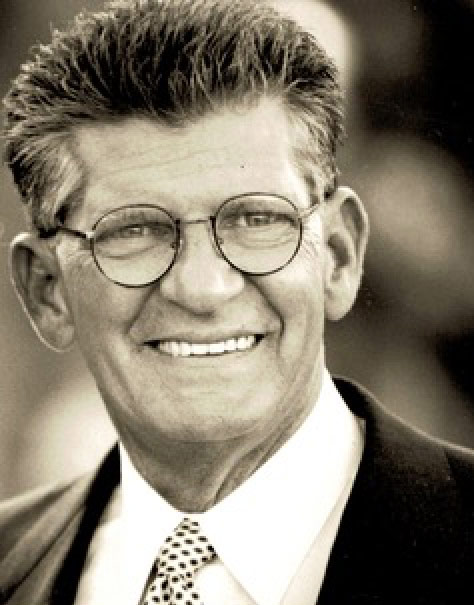
As he worked to overcome fear and secrecy about his own homosexuality, he wanted to help others do the same. This intention fueled his desire to write his memoir, not yet published. And it motivated him, in one of the final acts of his life, to make a gift to advance the cause of inclusivity and tolerance across all lines of difference.
With a bequest of $200,000, Esposito created the first endowment for Fordham’s Office of Multicultural Affairs, a fund that is now poised to bear fruit for the office’s programming. The funding arrives, in fact, in the midst of a Fordham fundraising campaign, Cura Personalis | For Every Fordham Student, that has diversity, equity, and inclusion at its heart.
“He would be so proud to be part of this campaign,” said Jackie Comesanas, senior director of gift planning in Development and University Relations at Fordham, who worked with Esposito on setting up his gift. Esposito wanted to make a diversity-related gift focused on the Bronx and Fordham, of which he had fond memories, she said.
In the Struggle
A Brooklyn native, Esposito worked in hotels and catering during his time at Fordham and went on to become a hotel casino executive and entrepreneur.
He served as vice president of sales for Fairmont Hotels, vice president of MGM Reno, and president of Bally’s Las Vegas, among many other roles. In 1988, he founded the successful sales and marketing consultancy Hotel Management International.
He was a driven executive, at times “over the top” in motivating his staff, he wrote in his memoir, My Name is Joe: The Journey of a Gay Recovering Alcoholic in the Casino Industry.
He was also a talented salesman whose strength was his authenticity, said Robert Benz, a longtime friend and former business partner of Esposito’s. “Being real and being himself was what made him a great salesman,” he said.
But Esposito also felt shame at not being more forthright about his sexuality. Was He gained clarity about his sexual orientation in his early 20s but still “compartmentalized” it and avoided the topic, he wrote in his memoir. He wrote of spending time with three nephews during their youth and young adulthood, traveling around the U.S. and Europe, but never discussing his sexuality with them until he had reached middle age.
“Here I was, now in my early forties, telling these guys in their twenties that I was gay,” he wrote.
One of them responded by saying “‘How could you spend so much time with me and hide who you are?’ I gave the standard answer that, “‘Being gay is not who I am,’” he wrote. And—“I asked him why he did not tell me that he was straight.” (Later on, he said, “it was fun being his gay uncle.”)
Esposito said he met many heterosexual people who stood up to anti-gay bigotry. But hate reared its head often. There was a day in 1980, at the MGM Reno, when his secretary came back from lunch and seemed to be hiding herself a bit. He walked around her desk and saw a red mark on her face.
“I do not know to this day how I knew that Maria had defended me,” he wrote. He responded with some gentle humor, telling her they couldn’t get into a fight with everyone that called him a name—“If we did, then we would both be fighting a lot with our 2,500 employees and neither one of us would get any work done.”

In 1984, he co-chaired the Las Vegas Task Force on AIDS with then-governor Grant Sawyer. The AIDS epidemic claimed the life of one of Esposito’s best friends, someone whose family hadn’t known he was gay. At a gathering following the funeral, Esposito wrote, “the gay people were on one side of the room, the family on the other, and a giant division in between,” as the family reeled from both the loss of their son and what they hadn’t known about him.
“My generation often kept our private lives hidden from family. It was wrong for us to do whether they accepted us or not,” he wrote. “It took away from our personal dignity.”
Esposito did his part to help people shed secrecy and fear about their orientation, said his husband, Edgar Esposito, whom he wed in Las Vegas in 2015.
“He was a person who wanted everybody to be happy, and just help as much as he could to make sure that those who are gay and in the closet a little bit make their way out in a much easier way,” Edgar said. “One of his nephews has a gay son, and the nephew came to him to talk about his son, and he kind of helped the nephew understand that acceptance is a very powerful thing, especially when it comes to your child.”
Alcoholics Anonymous
Sobriety, supported by the spiritual aspect of Alcoholics Anonymous, was an anchor of Esposito’s life. He turned to AA at age 30 to deal with “blackout” drinking rooted in childhood fears, inner emptiness, and the stresses related to being gay in a world that was not always tolerant. “Many people in my generation were fearful” about their sexual orientation, he wrote.
When he walked into his first AA meeting, “it was like I met people from my planet for the first time.”
Forty-six years of sobriety, he wrote, “is the most important accomplishment of my life.”
Esposito struggled with cancer toward the end of his life; he died on March 4, 2018, at the age of 76, within a year of signing the agreement to create an endowment at Fordham.
Impact of the Endowment
The Joseph E. Esposito Jr., FCRH ’63, Endowed Fund will help the Office of Multicultural Affairs expand its various efforts to foster cross-cultural competencies, engagement of diverse students, and a more welcoming and inclusive atmosphere, said Juan Carlos Matos, assistant vice president for student affairs for diversity and inclusion.
“Now we can reimagine things in ways that we couldn’t before,” Matos said. He plans to manage the funding for the greatest possible long-term impact. “I feel like there’s an obligation to make sure we’re spending any funds in an intentional way,” he said.
The endowment could help send students to diversity-related conferences or bring speakers to campus, for instance; it could also give the office’s student-run cultural committees latitude to come up with more on-campus programs and events.
With more events comes more student involvement, in a kind of “domino effect,” Matos said.
“Once you’re able to do some larger-scale programs that have an impact … you’ll naturally then have more students that are aware of either what the office does or ways to get connected, and then those students then join the committees and want to continue doing that work.”
The endowment could be used to sustain one-time events that drew a strong response from students, like the block party held at the Rose Hill campus during Welcome Week this past fall or the diversity graduation celebrations held last spring.
The celebrations for Black, Latinx, and LGBTQ students and students of Asian or Pacific Islander descent were held in conjunction with the Office of the Chief Diversity Officer, using funds that been freed up by the scaling down of in-person events during the pandemic lockdown of 2020-2021, Matos said.
The Esposito fund “allows us a level of sustainability for these really important events that we hope become markers of students’ experience here at Fordham,” he said. “The more you’re able to provide these experiences … that people look forward to, that increases a sense of belonging.”
Learn more about Cura Personalis | For Every Fordham Student and make a gift.
If you have a question about giving to Fordham, call 212-636-6550 or send an email to [email protected].
]]>When their names were called, graduates were honored with special stoles, pins, and other items celebrating their culture. Faculty and staff offered words of praise and encouragement, both virtually and in person. Speakers included Chief Diversity Officer Rafael Zapata, political science professor Christina Greer, and Joseph M. McShane, S.J., president of Fordham.
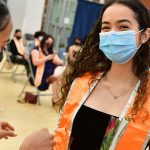

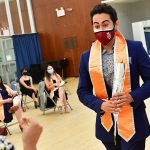
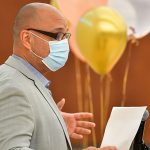
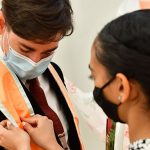
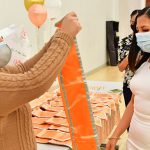
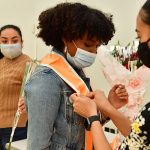
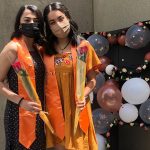
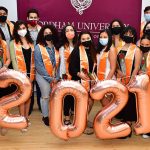
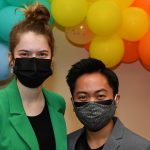

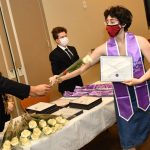
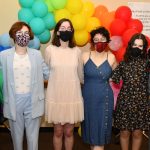
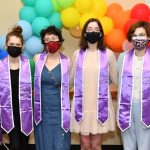
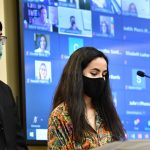
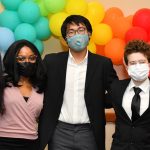
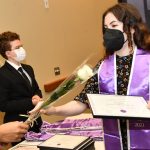
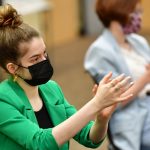
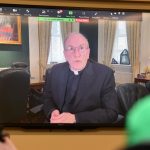
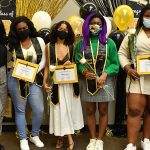
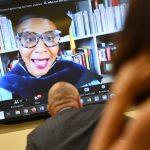
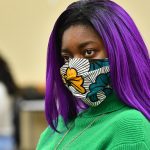
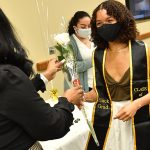
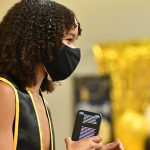
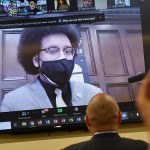
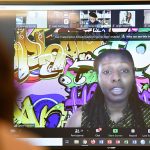
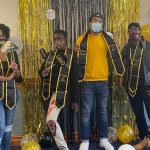





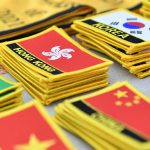





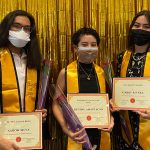
 Celebrations were held at both the Lincoln Center and Rose Hill campuses. They were sponsored by the Office of Multicultural Affairs and the Office of the Chief Diversity Officer in conjunction with the President’s Office and Senior Week.
Celebrations were held at both the Lincoln Center and Rose Hill campuses. They were sponsored by the Office of Multicultural Affairs and the Office of the Chief Diversity Officer in conjunction with the President’s Office and Senior Week.
The April 29 event was the deans’ second forum for alumni on their commitment to furthering the University’s action plan for addressing racism and educating for justice. Fordham announced the plan in June 2020 after nationwide protests against police brutality and racial injustice prompted members of the Fordham community to describe their own experiences of discrimination on campus.
“We’re asking hard questions, addressing proposals that have come forward, and moving forward indeed with hope and confidence into a future … that is marked by greater inclusivity, greater diversity, and greater commitment shared to building a much more just world as we educate for justice and seek to eradicate racism,” said Joseph M. McShane, S.J., president of Fordham, in opening remarks.
Father McShane and the four deans were joined by moderator Valerie Irick Rainford, FCRH ’86, a Fordham trustee who is spearheading anti-racism training efforts within the University, and Rafael Zapata, Fordham’s chief diversity officer.
The panelists spoke of changes underway in the curriculum, recruitment of faculty and students, new programs, and other efforts to embed anti-racism in the University and effect permanent change.
“For students to come here from different backgrounds, it is vitally important that they feel that this institution represents them, that they do not feel like … they are here on sort of sufferance, that they feel that their communities are a part and parcel of what makes Fordham tick, what makes Fordham an excellent place,” said Tyler Stovall, Ph.D., dean of the Graduate School of Arts and Sciences.
Faculty Diversity, Community Connections
Stovall emphasized the importance of forging links between the University and the diverse, vibrant communities surrounding the Rose Hill and Lincoln Center campuses. Zapata noted current efforts like a collaboration with the Bronx Book Festival and a speaker series focused on Bronx writers facilitated by faculty. “We are an institution of this wonderful borough, and I think that’s something we need to talk about a little bit more,” he said.
In efforts to diversify the faculty, Eva Badowska, Ph.D., dean of the Faculty of Arts and Sciences and associate vice president for arts and sciences, said 50% of the arts and sciences faculty members recruited to begin this academic year are people of color. In addition, Fordham announced the creation of the Margaret Peil Distinguished Chair in African and African American Studies and is currently recruiting for a newly created postdoctoral fellowship in critical race studies in the sociology and anthropology department, as well as a new position in the English department—a rhetoric specialist—to support the faculty’s work on revising the composition program toward anti-racist learning objectives and pedagogy.
Arts and Sciences also announced the creation of a new affiliate program in African and African American studies to elevate that department’s visibility and foster an interdisciplinary approach to anti-racism, Badowska said. Fifteen faculty members across departments have committed to joining the initiative.
On the point of hiring diverse faculty, Rainford noted that “once you hire those individuals, I think it’s also about inclusion and access.”
Stovall said a newly formed group of Fordham faculty members of color would be meeting soon to discuss diversity among faculty and at the University generally. “I think these leaders are going to have an awful lot to say, and it’s going to be up to us to listen,” he said.
He pointed out the importance of integration, “one of the terms we tend not to talk about.”
“Ultimately, what we are all about in this endeavor is producing an integrated educational experience and ultimately an integrated society,” he said. “Study after study has shown, in despite of people’s fears of integration, that actually integrated education benefits not just students of color but all students, and makes them stronger students.”
“This is a major pathway towards the ultimate goal of Fordham University,” he said.
Zapata said his office is offering a grant program titled Teaching Race Across the Curriculum to help academic departments integrate questions of race within their courses, particularly those that all students take.
“Students want to see themselves in the people that teach them, that they encounter throughout [the University], but they also want to see themselves in the curriculum. They’ve talked a lot about that,” he said.
Expanding Scholarship and Internship Opportunities
Laura Auricchio, Ph.D., dean of Fordham College at Lincoln Center, pointed to the Office of Undergraduate Admission’s “above-and-beyond” efforts to increase diversity among incoming students. Changes this year include an effort “to appreciate and value a wider range of student experiences in the admissions process,” she said, as well as new events for prospective students of color who would be part of the fall 2021 entering class.
Also important, Auricchio said, is the recently created Trustee Diversity Scholarship Fund, which grew out of a scholarship fund that Rainford founded. “Before we could even announce it, we were starting to get donations,” Rainford said.
A new Cultural Engagement Internships program, funded by Fordham College at Lincoln Center and Fordham College at Rose Hill, has created paid internships that place students with New York nonprofits and cultural organizations that mostly serve communities of color or advance the work of anti-racism. “This opens up the internship opportunities to students who might not otherwise be able to afford” to take unpaid internships, Auricchio said.
And diversity in the yearlong Matteo Ricci Seminar for high-achieving students on both campuses has grown by opening it up to all students who want to apply, rather than relying on a select pool of students recommended by faculty, she said; she also cited the importance of bringing on Assistant Dean Mica McKnight, a woman of color, as co-leader for the Fordham College at Lincoln Center program.
Supporting Students
In other efforts on the undergraduate level, Maura Mast, Ph.D., dean of Fordham College at Rose Hill, said administrators on both campuses are developing a program to support first-generation students—61% of whom are students of color—and their families as the students navigate college life. At Rose Hill, the college is expanding access to undergraduate research opportunities by developing a one-credit course on the ins and outs of conducting research, such as developing a proposal and finding a mentor, Mast said.
“It’s … so important that we intentionally support students as they are and who they are, when they get to Fordham and when they’re at Fordham—that we are transparent and effective in this work,” she said.
In a culmination of longstanding efforts to increase diversity in the college’s Honors Program, 60% of students offered admission this year are either BIPOC (Black, Indigenous, or people of color) or first-generation students, Mast said.
The University has also secured a planning grant from the Howard Hughes Medical Institute to join a national learning community aimed at building capacity for developing inclusive, equitable, anti-racist approaches to STEM education—in first-year “gateway” courses, in particular—to support students who are underrepresented in these fields, she said.
The panelists took questions, including one about why the University doesn’t have an Asian American studies program with a major and minor offered. Badowska said she had met with members of the faculty—which would have to propose any new program, according to University statutes—about surveying the existing classes and resources to see what might be offered immediately while they work on developing a program.
“It is the curriculum that reveals who we are, and it is our academic programs that say we’re an anti-racist university or we are not an anti-racist university,” she said. “So that’s one of the reasons why an Asian American studies program is so critical for us to develop at this moment.”
Eradicating Racism
In response to another question—“Do you really believe that racism can be eradicated at Fordham?”—Rainford spoke of a long-term effort.
“There are some that still believe that racism doesn’t exist,” said Rainford, who is Black. “But the fact of the matter is, it’s in the fabric of everything in the country.”
“It will take time and effort, and we will not eradicate racism in our lifetime, but we certainly can help advance racial equity,” such as through the efforts the deans described, she said.
Zapata responded, “It’s going to take courage, the courage to … listen to the experiences of people who don’t always feel they have a chance to voice their experiences.”
Stovall said, “We currently live in a world where scientists are literally talking about creating human immortality in less than a century. So in that kind of world, I think all sorts of things are possible, including eradicating racism.”
Hurdles to Surmount
Asked about obstacles the University faces, Mast mentioned funding—for staffing, on-campus housing, and financial aid, for instance.
Badowska spoke of the challenges that would be inherent in changing the University’s culture to a point where everyone in the arts and sciences community would possess the five competencies that the deans have proposed:
- Knowledge about racism, white privilege, and related topics;
- Self-knowledge and a commitment to self-work and continuous learning in these areas;
- Commitment to disrupting microaggressions and racist dynamics in the classroom, the workplace, and beyond;
- Commitment to systemic change through examining policies and practices to make sure they support racial equity; and
- Reimagined community and allyship, or a capacity to form equitable partnerships and alliances across racial lines.
“We know that we have a long road before we can say that everyone has these five capacities, but we’ve identified them,” she said.
The event drew 64 attendees, nearly all of whom stayed nearly a half-hour beyond the event’s one-hour allotted time.
“That, I think, shows the great hunger and thirst that the people of Fordham have for this great work that we’re about together,” Father McShane said. “One of the things we have to remind ourselves is that this is a beginning, and that’s an important observation and an important thing for us to own. We have a long journey ahead of us, but we are up for it and will keep at it.”
]]>The 2021 Tri-State ExploreCSR workshop, which began in February and wrapped up last month, aims to fix that.
The workshop brought together students and faculty from Fordham, the Stevens Institute of Technology, the University of Connecticut, and Google to learn or brush up on coding and computer science-related research. On April 23, the group celebrated with online presentations, a panel discussion, and poster board presentations on team projects.
Funding and Participation from Google
Ying Mao, Ph.D., an assistant professor of computer science at Fordham, said the project, which was funded by an $18,000 grant from Google, was created to break down barriers that students from all underrepresented populations might feel are keeping them from entering computer science.
“When we wrote our proposal, we actually broadened the domain of who we wanted to offer it to; usually it’s just for women. We included first-generation students who might not have imagined doing something in computer science,” he said.
The April event not only brought the students together, it allowed them to hear from experts in the field. It started off with a keynote address, Combinatorial Fusion Analysis: A new paradigm for combining multiple scoring systems, which was delivered by Frank Hsu, Ph.D., the Clavius Distinguished Professor of Computer Science at Fordham. He was followed by Adam Michael Wood of Google, who talked about Tensorflow, an open-source software platform that can be used to create machine learning models.
A panel discussion on the challenges and opportunities in computer science featured Fordham’s computer science professors Gary M. Weiss, Ph.D. and Damian Lyons, Ph.D., and the Stevens Institute’s Ye Yang, Ph.D., and Grace Bae, Ph.D.
Organizers put out the call for the in the beginning of the year and received 220 applicants from undergraduate students enrolled at 16 colleges throughout the tri-state region. Some were computer science majors looking for research opportunities; others were non-computer science majors. After an initial meeting on Feb. 22, the 58 chosen students were divided into 18 groups that met weekly to report on their progress.
Instilling Confidence
“Some of the research is very introductory level because the students are not from computer science backgrounds. One of my students was an economics major, so we designed a beginning research project so they could learn what computer science research looks like, to help them build self-confidence,” Mao said.
“They all showed how they learned to code and analyze the data, and since every group contained at least three students, how learned how to communicate with each other to build the project.”
Collaborating with Students from Other Universities
One of the students who attended was Navpreet Kaur, a junior at Fordham College at Lincoln Center. A math/economics interdisciplinary major, Kaur got involved in the field in earnest this fall, when she took her first class as part of a computer science minor. Under the guidance of Fordham’s Juntao Chen, Ph.D., the Ozone Park, Queens, resident worked with fellow Fordham student Maria Jara, as well as a student from Carnegie Mellon University and one from Hofstra University. Their project was titled “Fairness and Privacy in the Optimal Transport for Resource Allocation.”
The project involved applying a mathematical model used to determine how to allocate resources such as workers to places such as factories and mines so that they’re allocated fairly as well as efficiently. It’s the kind of formula that could also be applied to the distribution of vaccines.
“It seemed like a good opportunity to get experience, which I thought would help with internships or grad school, and just understanding how comp/sci really works,” she said.
Participating in the program introduced her to Fordham’s STEM program, and Kaur said she wants to take Dr. Chen up on the offer for more research opportunities next year. Working on the project made her feel confident that she’d be ready to participate in a larger research project that otherwise might seem overwhelming.
“I’m also glad we did it virtually since we were able to work with students from different universities with different backgrounds and different years,” she said. Working together with people with different experiences was very helpful.”
Mao said he plans to apply again for the grant next year and hold another workshop at a date to be determined.
]]>
